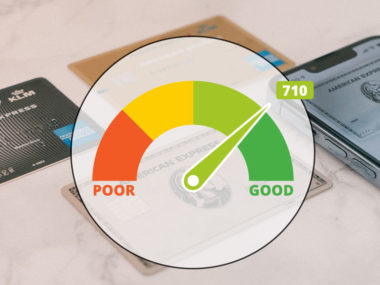
If you live in the United States, chances are you will have to deal with medical bills at some point in your life. Surveys show that 79 million Americans have problems with medical bills or debt — this is around 24% of the U.S. population.
Whether it’s from a broken bone or from a bout of food poisoning, sometimes life’s medical expenses can get pricey and difficult to stay on top of. If you are unable to pay your medical bills, you may face late payment fees, accrued interest, lawsuits, debt collection, and potential credit damage.
Table of Contents
Do Medical Bills Affect Your Credit?
While the vast majority of health providers will generally not report medical debt to the three credit bureaus, the same cannot be said of debt collection agencies. When a healthcare provider cannot collect on overdue accounts, they may send them to medical collections. This debt will then reflect on your credit report and it can potentially decrease your credit score.
Unless you have an excessive amount of medical debt to deal with, it’s easy to dismiss the potential ramifications of medical bills on your credit. However, you don’t need to have a mountain of medical debt for it to affect your credit score.
In fact, your credit takes a big hit any time a medical bill is sent to collections. This is generally a decrease of anywhere between 30 to 100 points, depending on the medical bill amount. This can easily move a “good” credit score into a “bad” credit score. Not to mention, being sent to collections will be part of your credit report for the foreseeable future.
Recent Changes to How Medical Bills Impact Credit
There have been a few changes surrounding how medical debt affects credit and credit agencies are easing up on medical debt reporting. They are able to differentiate between medical and non-medical collections to make a more accurate assessment of lending risk.
Unlike most other forms of debt, medical debt does not always reflect consumer choice or foreknowledge of the risks and rates involved, such as health insurance coverage, unforeseen charges, deductibles, premiums, and more.
With loans, lenders are obligated by law to disclose interest rates, terms, and loan amounts. Medical costs are largely opaque and vary depending on a variety of factors. This complicates the question of whether a medical debt is a fair or accurate representation of consumer behavior or lender risk. Note, however, that many lenders continue to see medical collections just like any other delinquent account.
There is a 180-day waiting period for medical debt to appear on your free credit report from one of the three credit reporting agencies. This gives you some time to handle any billing issues or to negotiate payments without putting your credit at risk.
How Long Does Medical Debt Stay on Your Credit Report?
Again, medical debt itself doesn’t end up on your credit report but a medical debt collections agency account does. Unless you get the collections removed from your credit report, it will exist as a derogatory mark on your report for seven years.
This can hold you back from getting proper insurance coverage, but you can also experience varying effects of bad credit such as difficulty getting approved for a loan or finding housing.
How to Get Medical Bills Off of Your Credit Report
Just because you pay off your medical bill that was sent to collections, doesn’t mean that the derogatory mark will be removed immediately. As mentioned above, this will exist on your credit report for seven years. There are two options for getting medical bills off of your credit report.
1. Dispute the Medical Bill
If you believe that there are errors with your medical bill, you may choose to dispute medical bills. The dispute process can be time consuming and difficult to navigate — it requires the following steps:
- Communicating with your health insurance provider;
- Requesting an itemized bill;
- Recalling witnesses (e.g. health care provider, loved one);
- Submitting a formal medical bill dispute.
In situations where you are unable to get the error fixed, it may be necessary to seek legal representation to navigate the issue. They will be able to review the billing issue, give you personalized advice, and pursue legal action if necessary.
2. Talk to Your Health Insurance Provider About Paying the Bill
When you pay your medical bill after it has been sent to collections, it will still exist on your credit report for seven years. However, when your health insurance provider pays a medical bill after it has been sent to collections, a credit bureau may be willing to remove the mark from your credit report.
If you think that your health insurance provider is willing to work with you, or that they should have paid the medical bill in the first place, reach out and take action accordingly.
How to Avoid Medical Debt and Collections
If you are worried about your credit, and your financial well being, then you want to avoid excessive medical debt or getting sent to collections. There are certain things you can proactively do to avoid this, including:
- Pay your medical bills: The simplest way to avoid accumulating medical debt or getting sent to medical collections is the obvious one: pay your bill and pay your bill on time;
- Negotiate your medical bills: If you are unable to pay for your medical bills, or you are paying your medical bills without insurance, you may want to consider trying to negotiate your medical bills. Healthcare facilities are generally more than willing to work with patients on an amount that will work for them. For example, you could negotiate the cost of an ambulance ride;
- Consider a repayment plan: More often than not, healthcare facilities would rather make something work with you than deal with collection agencies. Medical facilities generally offer repayment plans where patients pay small amounts incrementally over time. In some cases you may even be able to negotiate a medical debt repayment plan with no interest;
- Research financial assistance resources: There are numerous medical debt resources to take advantage of. Do your research and determine if you qualify for any financial assistance from Medicaid, local/state programs, or charities. You may even qualify for medical bill forgiveness;
- Monitor your medical bills: Be sure to make a habit out of monitoring your medical bills. By doing so, you can quickly catch any potential errors in your billing or payments. Then, you’ll be able to take action immediately before you get sent to collections, or the error appears on your credit report;
- Consider a billing advocate: If billing is overwhelming or too confusing for you, you may want to hire a billing advocate. Billing advocates are professionals who are trained to navigate complicated billing. They can help you manage, negotiate, and potentially eliminate your medical bills;
- Utilize crowdfunding: If you know that you are going to be unable to cover the costs of your medical care, then you should consider using crowdfunding for your medical expenses. Friends, loved ones, and sometimes complete strangers could be willing to help you in this difficult situation. Some popular crowdfunding platforms include GoFundMe and CoFund Health.
Medical debt, more specifically, getting sent to medical collections, can be time consuming and negatively impact your credit. As long as you can stay on top of your medical bills, or follow the ways listed above for avoiding medical debt and collections, you should be able to avoid your medical bills affecting your credit.
Image Source: https://depositphotos.com/





